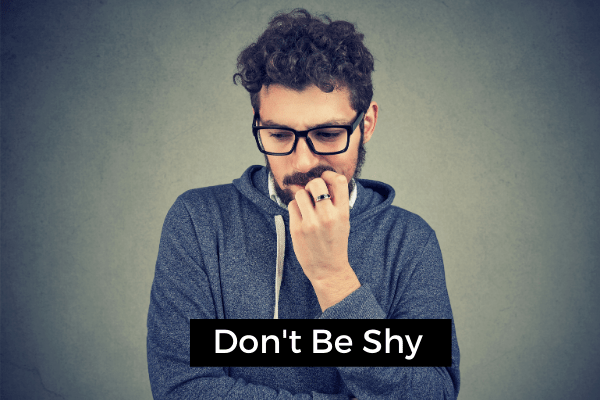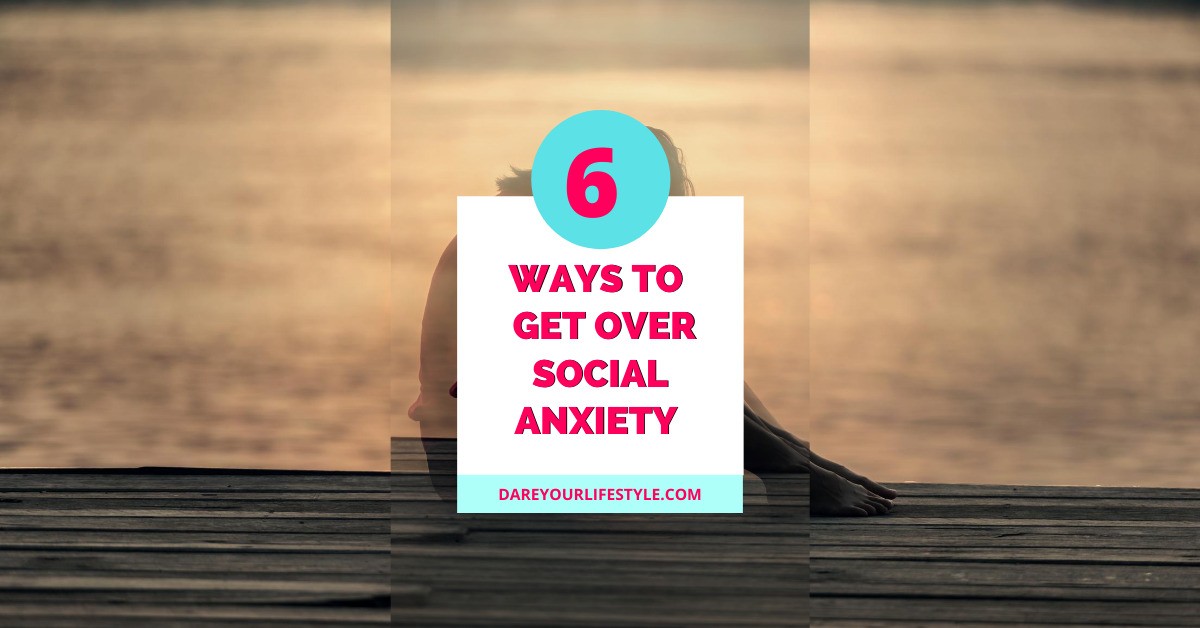Disclaimer: This post may contain affiliate links, meaning we get a small commission if you make a purchase through our link at no extra cost to you. For more information, please visit our Disclaimer Page.
Take control of your social life, learn ways to get over social anxiety.
Social anxiety is a widespread challenge that affects millions of people worldwide.
It’s more than just feeling shy or introverted; it’s an intense fear of social situations that can significantly impact your daily life, relationships, and career.
If you’re struggling with social anxiety, you’re not alone.
While shyness may cause discomfort in social settings, social anxiety triggers a much more profound fear of judgment, scrutiny, or embarrassment.
The good news is that social anxiety doesn’t have to control your life.
By understanding its causes, symptoms, and effective coping strategies, you can learn to manage your fears and thrive in social interactions.
This guide will equip you with the tools and knowledge to overcome social anxiety and build a more confident, fulfilling life.

Regardless of how painfully shy you might be and regardless of how terrible you feel, you can figure out how to reclaim your social life.
Table of Contents
What is Social Anxiety?
Social anxiety, also known as social phobia, is more than just feeling a little shy. It’s an intense and persistent fear of social situations that can significantly impact your life.
This fear often stems from a worry about being judged, embarrassed, or humiliated in front of others.
The symptoms of social anxiety can vary from person to person, but they often include physical sensations like sweating, trembling, and a rapid heartbeat.
Emotional symptoms may include feeling self-conscious, worrying excessively about social interactions, or experiencing panic attacks in social settings.
It’s important to distinguish between social anxiety disorder (SAD) and occasional social anxiety.
While most people experience some level of nervousness in social situations, SAD is a more severe and persistent condition that requires professional treatment.
Recognizing the signs and understanding the different types of social anxiety is crucial for seeking appropriate help and support.
Root Causes of Social Anxiety
- Genetics: A family history of anxiety disorders may increase the likelihood of developing social anxiety.
- Brain chemistry: Imbalances in neurotransmitters like serotonin and dopamine can contribute to heightened anxiety and fear responses.
- Life experiences: Past experiences such as bullying, trauma, or critical parenting can create negative beliefs about oneself and social interactions.
- Negative thought patterns: Cognitive distortions like catastrophizing, overgeneralizing, or mind reading can fuel anxiety in social situations.
Symptoms of social anxiety
Symptoms of Social Anxiety
Physical Symptoms:
- Blushing
- Sweating
- Trembling or shaking
- Rapid heartbeat or palpitations
- Nausea or upset stomach
- Shortness of breath
- Dizziness or lightheadedness
- Muscle tension
- Feeling like your mind has gone blank
Emotional and Behavioral Symptoms:
- Intense fear or anxiety in social situations
- Worrying about embarrassing or humiliating yourself
- Fear of being judged negatively
- Avoidance of social events or interactions
- Difficulty making eye contact
- Difficulty speaking or finding the right words
- Feeling self-conscious or insecure
- Overanalyzing social interactions after they happen
- Difficulty making or maintaining friendships
- Low self-esteem
- Depression or other mood disorders
9 Proven Ways to Get Over Social Anxiety
1. Identify Your Triggers:
The first step in overcoming social anxiety is understanding what sparks it. You need to reflect on specific situations or interactions that make you feel anxious. Once you know your triggers, you can develop strategies to manage them.
For example, my trigger was that I rushed my thoughts and thought about many things at once.
2: Challenge Negative Thought Patterns
Social anxiety is often fueled by negative thoughts and self-doubt. You should learn to identify these patterns and challenge them with evidence-based thinking. Replace self-critical thoughts with positive affirmations.
For example, I immediately challenge the negativity until I believe the positive or believe in the possibility of it.

You need to stop guessing or think you know what others are thinking.
Even if you are thinking a negative thought, what makes you think that the thought that you have of yourself is what people are actually thinking of you?
Just as how thinks could go wrong, things could go well. You are not yet in the situation but you think that that you are going to a good job.
You need to change those negative thoughts my friend.
Stop blowing things out of proportion and stop anticipating things like “I’m going to be nervous, I will sweat and stutter over my words and people will laugh at me.”
So what if that happens? Everyone has been there and understands that it is a part of life. It’s not as bad as your mind is leading you to believe.
3: Overcome Social Anxiety-Focus on others, Not Yourself
When you find yourself in a situation that requires you to be socially involved don’t get overwhelmed, don’t overthink it. That is where social anxiety creeps in.
Social anxiety often stems from excessive self-focus.
By shifting your attention to others, you can reduce self-consciousness and engage more authentically in conversations.
For example, I realized my problem was that I was always thinking about me:
What would they think about me?
What if this happens to me?
I had to stop and shift the focus. I wouldn’t be so anxious if I focused on others a bit.
When you are about to do something, look at the joy and value that others will get from it. Don’t think about the little nerves that you feel.
Concentrating on your nerves makes you increasingly mindful of how anxious you’re feeling and affects your performance.
Keep in mind that tension isn’t as noticeable as you might think.
Truly tune in to what you have to share and how it will benefit the audience.
What
you should be thinking about is how great you can make your presentation.
Consider how you need individuals to feel. Take the attention off you.
Focus on now, as opposed to stressing over what you’re going to say.
Think people, not you.
4: Overcome Your Fears
Practice Public Speaking: Public speaking is a common fear, even for those without social anxiety.
You can significantly boost your confidence by facing this fear head-on. Start small by speaking up in meetings or joining a Toastmasters club.
For example, I used to fear public speaking, thinking about who might like or want to see me or laugh at my fumbling because I had a slight stuttering problem.
But, I practiced and challenged the thoughts in my head until I became better at public speaking.
5: Try to be more social
Effectively searching for strong social settings is another powerful method for daring your feelings of fear and conquering beating social anxiety.
You can start going classes. Most of the courses that I’ve taken are online courses.
There are tons courses online that assist with overcoming social anxiety; many communication, leadership courses. You just have to out there.
You can volunteer in your field or areas that you’re passionate about. For example, I did a lot of volunteering at shelters doing personal development talks.
That is something I love and I’ve gone on many speaking engagements. I’ve developed the love for doing presentation so I lead many discussions at places that I’ve worked to build me socially and give me practice to engage with a crowd.
I’ve used one stone to kill two birds. I’m developing public speaking skills as well as social interaction skills. It does help to volunteer.
Every effort that you make is in itself already something worth being credited and praised for. It took so much courage for you to do. You’ve taken a bold step.
These little encouragements will motivate you to continue on that path to overcome social anxiety disorder.
No one’s perfect and everybody feels embarrassed at one point in their life. Overcoming social anxiety takes a lot of effort.
There will be times when you try to overcome social anxiety and feel like giving up but keep going at it. To be the best version of yourself, you have to be persistent and committed to overcoming your social anxiety.
6. Meditation and Reflection:
Incorporating meditation into your routine can help manage social anxiety. You can also reflect on your mood and channel it into something positive, such as listening to music.
For example, I meditate, and boy, oh boy, it works. I love music, so I listen to it and just reflect on my mood, channeling it into something positive.
7. Seek Professional Help:
If your social anxiety is severe or interfering with your daily life, don’t hesitate to seek professional help.
Cognitive-behavioral therapy (CBT) and exposure therapy have proven to be effective treatments for social anxiety disorder.
Practice these steps, get over social anxiety, and embrace the social elements of your life.
You are awesomely unique. Dare that social anxiety in your life; become a better you, live a better life.
Quotes to Get Over Social Anxiety
- Embrace your voice; it’s a unique melody worth hearing.
- Confidence is the quiet courage to be yourself in any room.
- Your presence is a gift; let it shine without fear.
- Every step outside your comfort zone is a victory.
- The world is richer for your presence and perspective.
- Anxiety is a visitor; your strength is the host.
- Your true self is a light that can’t be dimmed.
- The courage to be seen is the path to freedom.
- Social anxiety fades when you focus on your inner strength.
- Every brave moment is a step toward becoming who you are meant to be.
On a Final Note
Overcoming social anxiety is a journey, not a race. It takes time, effort, and most importantly, kindness towards yourself. Remember, you’re not alone in this.
Many people struggle with social anxiety, and there are countless others who have successfully navigated this path.
Be patient with yourself and celebrate each small victory. Whether it’s making eye contact with a stranger, initiating a conversation, or attending a social event, every step forward is progress.
If you find yourself struggling, don’t hesitate to seek support. Talk to a trusted friend, family member, or therapist.
There are also online communities and resources dedicated to helping people find ways to get over social anxiety.
With the right tools and support, you can build confidence, develop social skills, and live a life free from the grip of social anxiety.
Embrace the journey, trust the process, and never give up on yourself.






